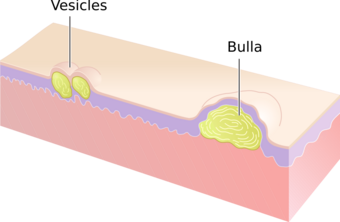Medicine:Vesiculobullous disease
From HandWiki
| Vesiculobullous disease | |
|---|---|
 | |
| Diagram showing cross section of vesicles (left) and bullae (right) on skin. |
A vesiculobullous disease is a type of mucocutaneous disease characterized by vesicles and bullae (i.e. blisters). Both vesicles and bullae are fluid-filled lesions, and they are distinguished by size (vesicles being less than 5–10 mm and bulla being larger than 5–10 mm, depending upon which definition is used). In the case of vesiculobullous diseases which are also immune disorders, the term immunobullous[1] is sometimes used. Examples of vesiculobullous diseases include:
- Infectious: (viral)
- Herpes simplex
- Varicella-Zoster infection
- Hand, foot and mouth disease
- Herpangina
- Measles (Rubeola)
- Immunobullous:
- Pemphigus vulgaris[2]
- Pemphigoid
- Dermatitis herpetiformis[1]
- Linear immunoglobulin-A disease (linear IgA disease)
- Genetic:
Some features are as follows:
| Name | Acantholysis? | Ig |
|---|---|---|
| epidermolysis bullosa | yes | mostly IgG |
| bullous pemphigoid | no | mostly IgG |
| dermatitis herpetiformis | no | IgA |
References
- ↑ Magro, C. M.; Roberts-Barnes, J.; Crowson, A. N. (2012). "Direct Immunofluorescence Testing in the Diagnosis of Immunobullous Disease, Collagen Vascular Disease, and Vascular Injury Syndromes". Dermatologic Clinics 30 (4): 763–798, viii. doi:10.1016/j.det.2012.06.008. PMID 23021058.
- ↑ Williams DM (December 1989). "Vesiculobullous mucocutaneous disease: pemphigus vulgaris". Journal of Oral Pathology and Medicine 18 (10): 544–53. doi:10.1111/j.1600-0714.1989.tb01551.x. PMID 2695619.
- ↑ "Vesiculobullous lesions in lipoid proteinosis: a case report". Dermatol. Online J. 14 (7): 16. 2008. doi:10.5070/D33FQ584H1. PMID 18718200. http://dermatology.cdlib.org/147/case_presentation/lipoid_proteinosis/rao.html.
External links
| Classification |
|---|
 |

